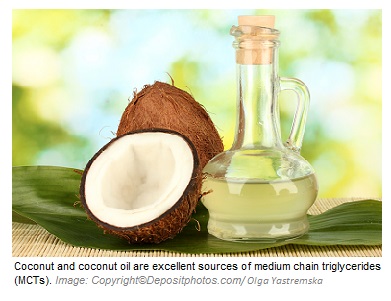 absorbed into the blood stream. They are not usually stored in the body and are metabolized by the liver and muscles to generate energy.
absorbed into the blood stream. They are not usually stored in the body and are metabolized by the liver and muscles to generate energy.Natural Sources:
Coconut oil and palm oil are excellent sources of MCTs. However, they can be found in small amounts in dairy products and butter.
Athletic Benefits of MCTs:
The fact that MCTs are absorbed quicker than long chain triglycerides (LCTs) has made them popular in bodybuilding. Moreover, MCTs do not require carnitine to get into the mitochondria of the cells. In fact, they are potentially quick sources of high energy for the body during intense training. During intense and endurance training or competition, MCTs are easily accessible to be used for energy production after glycogen storages are used up. It has been also hypothesized that MCTs could spare muscle glycogen.
A major drawback of MCTs is that they can convert in the body into ketones. The buildup of  ketones in the body makes the body acidic and impairs energy systems. Thus, long term consumption of MCTs is not recommended. And endurance athletes should discontinue taking MCTs 2 – 3 weeks before a major event.
ketones in the body makes the body acidic and impairs energy systems. Thus, long term consumption of MCTs is not recommended. And endurance athletes should discontinue taking MCTs 2 – 3 weeks before a major event.
Potential benefits of MCTs in athletes are:
- May provide energy during prolong and intense training.
- Improves athletic performance.
- May delay exhaustion time.
- May have a protective effect against rhabdomyolysis.
Non – Athletic Benefits of MCTs:
MCTs are claimed to be beneficial in the following conditions:
- Hypothyroidism.
- Diabetes.
- Epilepsy (to produce ketosis via ketogenic diet).
- Neurodegenerative diseases:
- Weight loss associated with AIDS.
- As a support in:
- Celiac disease.
- Liver disease.
- Steatorrhea (poor absorption of fat followed by an increased fat in stool).
- Short bowel syndrome.

- Chyluria (milky urine).
- Cystic fibrosis.
Dosage and Side Effects:
The typical dosage is 15 – 30 grams per day. However, athletes generally use up to 50 grams a day. To reduce side effects and better absorption, it is better taken with foods. Some MCTS users may experience diarrhea, vomiting, irritability, nausea, stomach discomfort, and bloating.
Interactions:
MCTs may cause essential fatty acid deficiency. So, you should consume formulations that contain Omega – 3 fatty acids as well. They may also raise cholesterol and triglyceride levels. People with diabetes should not take MCTs for a long term, as they predispose them to ketoacidosis.

